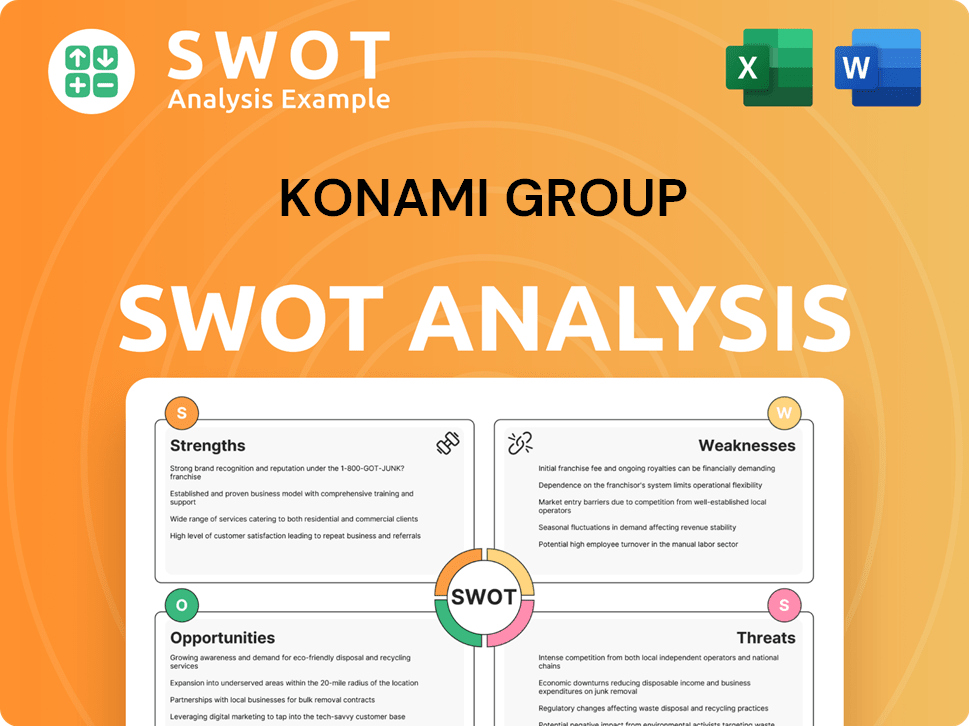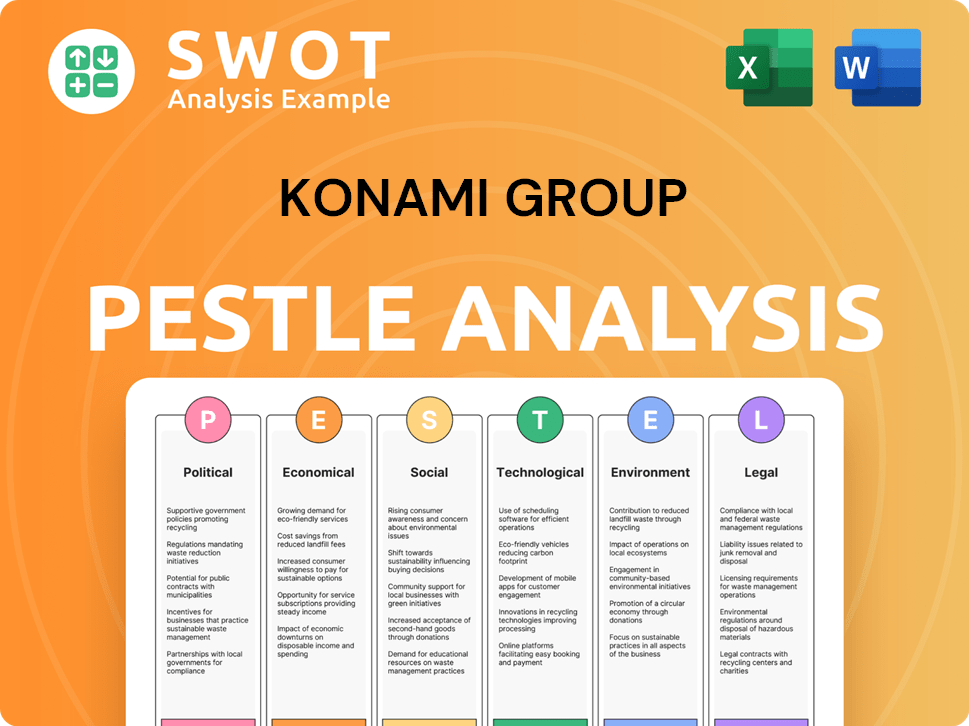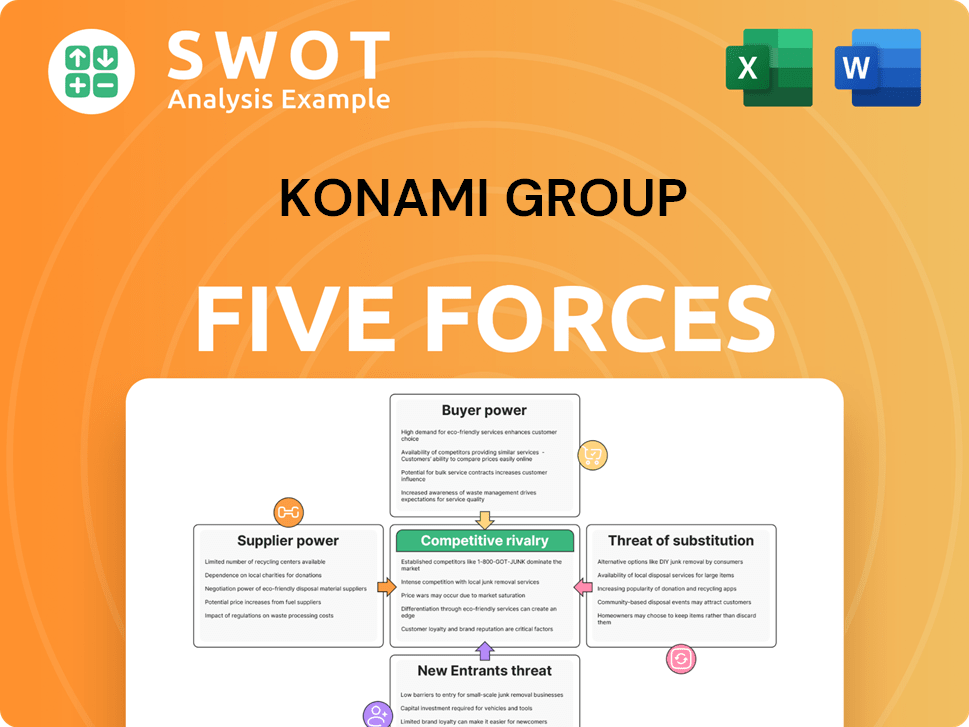Konami Group Bundle
How Does Konami Group Dominate the Entertainment Industry?
From its humble beginnings in 1969, Konami Group has transformed from a jukebox repair shop into a global entertainment powerhouse. This evolution showcases a dynamic Konami Group SWOT Analysis of its ability to adapt and thrive. With record-breaking revenue in fiscal year 2025, understanding Konami's sales and marketing strategy is crucial for anyone seeking insights into successful business models.

This deep dive into Konami's sales and marketing approach will dissect its strategies, examining how it leverages its iconic franchises like 'Metal Gear' and 'eFootball' to maintain its market leadership. We'll explore Konami's digital marketing strategies, promotional activities, and competitive landscape analysis, revealing the tactics behind its impressive revenue streams and sustained growth. Understanding Konami's business model provides valuable lessons for investors and business strategists alike, offering insights into effective market expansion strategies and brand positioning.
How Does Konami Group Reach Its Customers?
The sales channels employed by the Konami Group are diverse, catering to its varied business segments and global customer base. The company strategically utilizes both online and offline avenues to maximize its market reach. This multifaceted approach is crucial for effectively distributing its products and services across different geographical regions and consumer preferences.
Konami's digital entertainment division, which includes video games and trading card games, heavily relies on e-commerce platforms and digital storefronts, such as the PlayStation Store, Xbox Games Store, Nintendo eShop, and Steam. The company also leverages its official website for direct sales and information dissemination. For physical products like trading cards, Konami combines online sales with a network of physical retail locations, including hobby stores and major retailers.
In its Gaming & Systems business, Konami focuses on B2B sales, utilizing direct sales teams and strategic partnerships with casino operators globally. The Sports business operates physical locations under the Konami Sports Club brand in Japan, while also expanding into asset-light models like the 'Pilates Mirror' studio brand. This demonstrates a strategic refinement of its sales and distribution channels to align with specific market needs and competitive landscapes.
Digital distribution platforms are key for video game sales, with the 'eFootball' series achieving over 800 million cumulative downloads across various platforms. The company's official website also plays a role in direct sales and information sharing. This strategy is part of the overall Growth Strategy of Konami Group.
For trading card games, Konami uses a network of physical retail locations, including hobby stores and major retailers. These channels are vital for community building and event-based sales. Online sales channels are also utilized to complement the physical retail presence.
Konami's Gaming & Systems business focuses on B2B sales, relying on direct sales teams and strategic partnerships. The company's SYNKROS casino management system has been installed at major casino facilities. Key subsidiaries like Konami Gaming, Inc. drive sales in North America.
The Sports business operates physical locations under the Konami Sports Club brand in Japan. The company is expanding into asset-light models, such as its 'Pilates Mirror' studio brand. Konami is also involved in operating sports facilities on behalf of local governments.
Konami's sales strategy involves a shift towards greater digital adoption, especially for video games. This is balanced with maintaining a strong physical retail presence for products like trading cards. The company is also refining its sales channels to adapt to market changes.
- Emphasis on digital distribution platforms for video games.
- Continued importance of physical retail for trading card games.
- B2B sales focus for Gaming & Systems, with strategic partnerships.
- Expansion into diversified service delivery in the Sports business.
Konami Group SWOT Analysis
- Complete SWOT Breakdown
- Fully Customizable
- Editable in Excel & Word
- Professional Formatting
- Investor-Ready Format

What Marketing Tactics Does Konami Group Use?
The marketing tactics employed by the Konami Group are multifaceted, blending digital and traditional methods to enhance brand awareness, generate leads, and boost sales across its diverse portfolio. This approach is crucial for the company's Konami sales strategy, ensuring it reaches a broad audience and maintains a competitive edge in the gaming and entertainment markets.
Digital marketing is a cornerstone of the Konami marketing strategy, utilizing content marketing, SEO, paid advertising, and email marketing to engage with customers. Furthermore, influencer partnerships and social media engagement are key components, especially in the Digital Entertainment segment. The company also leverages traditional media, such as TV commercials and print ads, for broader brand awareness and specific product launches.
Data-driven marketing is central to Konami's approach, with customer segmentation and personalization driving tailored content and offers. This strategy allows for effective targeting of diverse audiences, including hardcore gamers, casual players, and sports enthusiasts. The company continuously adapts its marketing strategies in response to changing market conditions and consumer behavior, as demonstrated by its pivot during the COVID-19 pandemic.
Digital marketing strategies are crucial for Konami Group, encompassing content marketing, SEO, and paid advertising across various platforms. This approach supports the company's goal of reaching a wide audience and driving sales.
Content marketing leverages iconic franchises like Metal Gear, Silent Hill, and Yu-Gi-Oh! to create engaging content. This strategy helps build brand loyalty and attract new customers.
Paid advertising campaigns are extensively used on social media and gaming-specific websites to promote new releases and ongoing titles. This ensures high visibility and drives sales.
Influencer collaborations are vital, particularly in the Digital Entertainment segment. For example, the promotion of Getsu Fūma Den: Undying Moon involved influencer marketing.
Social media platforms are actively used for community engagement, brand building, and direct communication with fans. This enhances customer relationships and brand loyalty.
Traditional media, such as TV commercials and print ads, still play a role in broader brand awareness. This complements digital marketing efforts.
Konami's data-driven approach involves analyzing customer behavior and market trends to refine its strategies. This enables the company to tailor marketing messages to different audience segments, such as hardcore gamers, casual players, and sports enthusiasts. Personalization is a key focus, aiming to deliver relevant content and offers to individual users. To understand more about the Konami business model and how it supports these marketing efforts, explore the Growth Strategy of Konami Group.
Konami's marketing tactics are a blend of digital and traditional methods, supported by data analysis and customer segmentation. This ensures effective reach and engagement across various platforms.
- Content Marketing: Utilizing rich IP to create engaging content around iconic franchises.
- SEO: Ensuring high visibility in the competitive gaming market.
- Paid Advertising: Promoting new releases and ongoing titles on digital platforms.
- Email Marketing: Nurturing customer relationships and announcing updates.
- Influencer Partnerships: Collaborating with influencers and celebrities to boost visibility.
- Social Media: Engaging with fans and building brand communities.
- Traditional Media: Using TV commercials and print ads for broader awareness.
- Data-Driven Marketing: Analyzing customer behavior and market trends.
- Customer Segmentation: Tailoring marketing messages to different audiences.
- Personalization: Delivering relevant content and offers to individual users.
Konami Group PESTLE Analysis
- Covers All 6 PESTLE Categories
- No Research Needed – Save Hours of Work
- Built by Experts, Trusted by Consultants
- Instant Download, Ready to Use
- 100% Editable, Fully Customizable

How Is Konami Group Positioned in the Market?
Konami Group strategically positions its brand by focusing on providing 'Valuable Time' through innovative entertainment experiences. This core message is designed to emphasize the enjoyment and engagement its products offer to customers globally. The company leverages its extensive portfolio of iconic and long-standing intellectual properties (IPs) to differentiate itself from competitors.
The company's brand value, estimated at approximately $1.27 billion as of 2023, reflects its legacy of innovation and quality. Konami's visual identity and tone of voice are tailored to each business unit, consistently conveying a sense of quality and entertainment. Its focus on innovation and user experience aims to evoke positive emotions in its games, enhancing brand value and product appeal.
Konami's brand consistency is maintained across various channels, from game interfaces to its health and fitness clubs. The company continuously adapts to shifts in consumer sentiment and competitive threats by evolving its offerings and exploring new technologies. For a deeper understanding of how Konami navigates its market, consider exploring the Competitors Landscape of Konami Group.
Konami positions itself as a provider of 'Valuable Time' through entertainment. This focus highlights the enjoyment and engagement its products offer to customers worldwide. The company's strategy emphasizes the emotional connection users have with its games and services.
Konami differentiates itself through its extensive portfolio of iconic IPs. These include franchises like Metal Gear, Silent Hill, and Yu-Gi-Oh!, which have cultivated strong customer loyalty. This legacy contributes significantly to its brand value.
The visual identity varies across business units but consistently conveys quality and entertainment. The marketing communications often emphasize passion and connection with the fan base. This approach is particularly evident in the gaming sector.
The Digital Entertainment segment is the largest revenue contributor, generating ¥305.2 billion (72% of total revenue) in the fiscal year ended March 31, 2025. This reflects the strong brand impact in this area. This showcases the success of Konami's Konami sales strategy and Konami marketing strategy.
Konami maintains brand consistency across various channels, from game interfaces to health clubs. This ensures a unified brand experience for its customers. This consistent approach supports the overall Konami business model.
The company continuously responds to shifts in consumer sentiment and competitive threats. Konami evolves its offerings and explores new technologies, such as Web3.0, NFTs, AI, and VR/AR. This adaptability is key for Konami market analysis.
Despite competition from major players, Konami has maintained its market position. This is achieved through reliable systems and innovative designs. Understanding the Konami's competitive landscape analysis is crucial.
Konami focuses on innovation and user experience to evoke positive emotions in its games. This includes developing new game titles and system features. This approach is vital for Konami revenue streams.
The Digital Entertainment segment, including video games and the Yu-Gi-Oh! Trading Card Game, is the largest revenue contributor. This highlights the strong brand impact in this area. This demonstrates the success of Konami's digital marketing strategies.
Konami is actively expanding into new businesses utilizing Web3.0, NFTs, AI, VR/AR, and 5G/6G technologies. This demonstrates its commitment to staying at the forefront of entertainment innovation. This forward-thinking strategy supports Konami's market expansion strategies.
Konami Group Business Model Canvas
- Complete 9-Block Business Model Canvas
- Effortlessly Communicate Your Business Strategy
- Investor-Ready BMC Format
- 100% Editable and Customizable
- Clear and Structured Layout

What Are Konami Group’s Most Notable Campaigns?
The Konami Group has strategically executed several impactful sales and marketing campaigns, significantly influencing its brand and driving growth, particularly in its Digital Entertainment sector. These campaigns are crucial to understanding the company's overall target market and its approach to sales and marketing.
A key aspect of Konami's sales strategy involves leveraging popular franchises and adapting to market trends. This includes a focus on digital distribution, continuous content updates, and strategic use of social media and digital platforms to engage with a global audience. These elements are central to their Konami marketing strategy.
The success of these campaigns demonstrates Konami's ability to innovate, adapt, and effectively reach its target audience. This is evident in the continued success of established franchises and the strategic expansion into new markets and platforms.
The eFootball series stands out as a major campaign, with over 800 million cumulative downloads globally across various platforms. This free-to-play football simulation focuses on global market penetration and sustained user engagement through regular updates.
The relaunch of the Silent Hill franchise, highlighted by the Silent Hill 2 remake, which sold over two million copies, is another key campaign. The objective was to revitalize a leading IP and introduce it to new audiences. The campaign leverages digital storefronts and social media.
Campaigns for Professional Baseball Spirits 2024-2025 and eBaseball MLB Pro Spirit have been successful, particularly with the endorsement of Shohei Ohtani. These campaigns capitalize on the popularity of baseball in Japan and North America.
The 25th-anniversary project for the Yu-Gi-Oh! Trading Card Game has been a significant marketing highlight. During the pandemic, the company promoted the 'Remote Duel' format, contributing to the success of the Duel Links mobile platform.
These campaigns show how Konami uses various strategies, including celebrity endorsements, digital distribution, and adapting to market changes, to maintain and increase its market share. The ongoing success of these initiatives indicates the company's strong understanding of its target audience and its effective execution of its Konami sales and marketing approach.
Konami Group Porter's Five Forces Analysis
- Covers All 5 Competitive Forces in Detail
- Structured for Consultants, Students, and Founders
- 100% Editable in Microsoft Word & Excel
- Instant Digital Download – Use Immediately
- Compatible with Mac & PC – Fully Unlocked

Related Blogs
- What are Mission Vision & Core Values of Konami Group Company?
- What is Competitive Landscape of Konami Group Company?
- What is Growth Strategy and Future Prospects of Konami Group Company?
- How Does Konami Group Company Work?
- What is Brief History of Konami Group Company?
- Who Owns Konami Group Company?
- What is Customer Demographics and Target Market of Konami Group Company?
Disclaimer
All information, articles, and product details provided on this website are for general informational and educational purposes only. We do not claim any ownership over, nor do we intend to infringe upon, any trademarks, copyrights, logos, brand names, or other intellectual property mentioned or depicted on this site. Such intellectual property remains the property of its respective owners, and any references here are made solely for identification or informational purposes, without implying any affiliation, endorsement, or partnership.
We make no representations or warranties, express or implied, regarding the accuracy, completeness, or suitability of any content or products presented. Nothing on this website should be construed as legal, tax, investment, financial, medical, or other professional advice. In addition, no part of this site—including articles or product references—constitutes a solicitation, recommendation, endorsement, advertisement, or offer to buy or sell any securities, franchises, or other financial instruments, particularly in jurisdictions where such activity would be unlawful.
All content is of a general nature and may not address the specific circumstances of any individual or entity. It is not a substitute for professional advice or services. Any actions you take based on the information provided here are strictly at your own risk. You accept full responsibility for any decisions or outcomes arising from your use of this website and agree to release us from any liability in connection with your use of, or reliance upon, the content or products found herein.